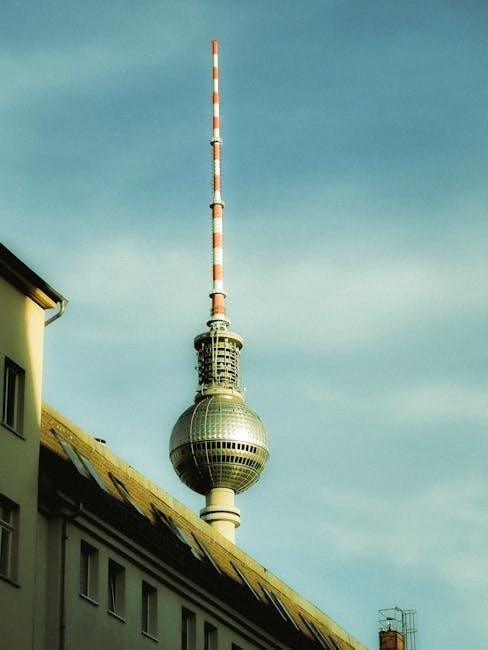Welcome to the Antenna TV Guide for Nashville, TN! This guide helps you navigate free over-the-air TV channels, offering local networks, sports, news, and entertainment.
Discover the best channels, antennas, and tips for optimal reception in Nashville. Stay informed about schedules, troubleshoot common issues, and enjoy free TV with ease.
1.1 Overview of Antenna TV in Nashville
Antenna TV in Nashville offers a cost-effective way to enjoy local and network television without cable or satellite subscriptions. Residents can access major networks like ABC, CBS, NBC, and FOX, along with community channels and special interest programs. The service relies on over-the-air broadcasts, providing free, high-quality HD signals. With the right antenna setup, viewers can receive a wide range of channels, including sports, news, and entertainment. Nashville’s geographic location allows for strong signal reception, making it an ideal city for antenna TV users. This guide helps you maximize your viewing experience by providing detailed channel lineups, installation tips, and troubleshooting advice.
1.2 Benefits of Using an Antenna for TV Reception
Using an antenna for TV reception in Nashville offers numerous benefits. It provides free access to local and network channels, eliminating the need for expensive cable or satellite subscriptions. With an antenna, you can enjoy high-definition TV signals without monthly fees, offering a cost-effective solution for entertainment. Additionally, antennas often receive channels that streaming services may not carry, including local news, sports, and community programs. The setup is straightforward, and once installed, there are no ongoing costs. This makes antenna TV a practical choice for budget-conscious viewers seeking reliable, high-quality television viewing in the Nashville area.
1.3 How to Get Started with Antenna TV
Getting started with antenna TV in Nashville is simple. Begin by researching your location to determine which channels are available. Use online tools to assess your area’s signal strength and identify the best antenna type for your needs. Next, choose an antenna—indoor or outdoor—based on your location and signal requirements. Install the antenna in a location with minimal obstructions, such as a window or rooftop, to ensure optimal reception. Finally, connect the antenna to your TV and scan for channels. This process allows you to access free, high-quality TV programming without subscription fees, making it a cost-effective and reliable option for viewers in Nashville.

Understanding TV Channels and Frequencies
Understanding TV channels and frequencies is crucial for optimal antenna setup. Channels operate on VHF (Low/High) and UHF bands, with RF numbers guiding antenna selection for Nashville viewers.
2.1 RF Channel Numbers and Their Importance
RF (Radio Frequency) channel numbers are essential for identifying specific broadcast frequencies. In Nashville, these numbers help determine which TV stations operate on VHF or UHF bands. Understanding RF channels ensures proper antenna selection, as certain antennas perform better on specific frequency ranges. For instance, outdoor antennas often capture both VHF and UHF signals effectively, while indoor antennas might struggle with lower VHF frequencies. Knowing your local RF channels allows you to optimize your antenna setup for the best possible reception. This is crucial for enjoying free over-the-air TV without interference or signal loss. By referencing RF channel numbers, viewers in Nashville can ensure they receive all available local and network channels clearly.
2.2 Difference Between VHF and UHF Channels
VHF (Very High Frequency) and UHF (Ultra High Frequency) channels differ in their broadcast ranges and signal characteristics. VHF channels (2-13) typically cover longer distances but are more susceptible to physical obstructions like buildings and hills. UHF channels (14-51) have shorter ranges but penetrate obstacles better, making them ideal for urban areas like Nashville. Antennas designed for VHF often have longer elements, while UHF antennas are more compact. Understanding these differences helps viewers choose the right antenna for their location. In Nashville, a combination of both VHF and UHF channels is available, so using an antenna that supports both ensures access to all local stations. This balance is key for maximizing free TV channel reception effectively.
2.3 How to Determine the Best Channels for Your Location
To determine the best channels for your location in Nashville, use online tools like the TV Channel Lookup or Antenna Recommendation Engines. Enter your zip code to generate a list of available channels based on your area. These tools analyze signal strength and broadcast frequencies (VHF/UHF) to provide a tailored channel lineup. Additionally, consult TV Guide Listings for Nashville to identify popular and local stations. Consider the distance from broadcast towers and potential obstructions when selecting channels. Outdoor antennas generally receive more channels with better clarity. By combining these methods, you can optimize your channel selection and enjoy a wide range of free TV programming in Nashville.

Choosing the Right Antenna
Selecting the right antenna involves considering your location, signal strength, and channel frequencies. Use online tools to determine the best antenna type for your area.
3.1 Types of Antennas: Indoor vs. Outdoor
Choosing between indoor and outdoor antennas depends on your location and signal strength. Indoor antennas are compact and easy to install, ideal for urban areas with strong signals. Outdoor antennas, while more complex to set up, offer better reception, especially in rural or low-signal areas. They are typically mounted on roofs or high structures to capture signals more effectively. For Nashville residents, outdoor antennas are often recommended due to varying signal strengths across the city. Both types have their advantages, but selecting the right one ensures optimal TV channel reception. Consider your specific needs and location when deciding between indoor and outdoor antennas for the best viewing experience;
3.2 Factors to Consider When Selecting an Antenna
When choosing an antenna, consider your location, signal strength, and the types of channels you want to receive. Use tools like Channel Master’s recommendation engine to analyze your address and determine the best antenna for your area. Ensure the antenna supports both VHF and UHF channels, as Nashville stations broadcast on both frequencies. Consider the number of channels you want to access and the antenna’s range. Outdoor antennas generally offer better reception but require proper installation. Indoor antennas are more convenient but may have limited range. Check reviews and ratings to ensure durability and ease of use. Your choice should balance performance, cost, and installation complexity to optimize your viewing experience in Nashville.
3.3 Recommended Antennas for Nashville Area
For the Nashville area, top-rated antennas include the Channel Master CM-4228HD and CM-7777. These models are known for their strong reception of both VHF and UHF channels, ensuring access to all major networks and local stations. The CM-4228HD is a popular choice for its multi-directional design, capturing signals from various broadcast towers. The CM-7777, with its built-in amplifier, enhances signal strength, making it ideal for areas with weaker signals. Both antennas support 4K and HDR, providing crystal-clear viewing. For optimal performance, outdoor antennas are highly recommended due to Nashville’s varied terrain. These antennas are durable, easy to install, and compatible with most modern TVs, ensuring reliable access to free over-the-air channels in the region.

Installing Your Antenna
Mount your antenna in a high, stable location to maximize signal strength. Use a signal meter for precise aiming and secure installation to ensure optimal reception in Nashville.
4.1 Best Practices for Antenna Installation
For optimal performance, install your antenna in a high, stable location to minimize signal interference. Use a signal meter to ensure accurate alignment with broadcast towers. Secure the antenna firmly to withstand wind and weather conditions. Ground the antenna properly for safety and to prevent damage from lightning strikes. Test the antenna by scanning for channels and adjusting its position if needed. Consider professional installation if you’re unsure about the process. Regularly inspect the antenna and connections for wear or damage. By following these steps, you can ensure reliable signal reception and enjoy high-quality TV viewing in Nashville.
4.2 How to Mount an Outdoor Antenna
MOUNTING AN OUTDOOR ANTENNA REQUIRES CAREFUL PLANNING to ensure optimal signal reception. Choose a sturdy location, such as a roof, attic, or tall pole, with minimal obstructions like trees or buildings. Use a durable mounting bracket and secure the antenna firmly to withstand wind and weather. Connect the antenna to your TV using high-quality coaxial cables to minimize signal loss. Test the antenna’s signal strength by scanning for available channels and adjust its position for the best reception. Consider grounding the antenna for safety and to protect it from lightning strikes. Regularly inspect the mount and connections to ensure stability and performance. Proper mounting ensures reliable access to free over-the-air TV channels in Nashville.
4.3 Tips for Optimizing Antenna Placement
OPTIMIZING YOUR ANTENNA PLACEMENT ENSURES THE BEST SIGNAL RECEPTION. Start by using a signal analyzer app to identify the strongest broadcast tower directions. Mount the antenna as high as possible to reduce obstructions like trees or buildings. Point the antenna toward the primary broadcast towers for maximum signal strength. Experiment with different locations and angles to find the sweet spot. Use a rotor if you need to adjust the antenna’s direction frequently. Avoid placing the antenna near metal objects or electrical interference sources. Regularly test signal strength by scanning for channels and adjust the antenna as needed. Proper placement can significantly improve your viewing experience with free over-the-air TV in Nashville.

TV Channel Lineups in Nashville
Nashville offers a diverse range of TV channels, including major networks, local community stations, and special interest channels for sports, news, and entertainment, catering to all viewer preferences.
5.1 Major Network Channels Available
Nashville residents can access a variety of major network channels using an antenna, including ABC, CBS, NBC, FOX, and PBS. These networks provide a wide range of programming, such as national news, sports, dramas, and live events. Local affiliates like WKRN (ABC), WSMV (NBC), WTVF (CBS), WZTV (FOX), and WNPT (PBS) ensure that viewers stay connected to both national and local content. With an antenna, you can enjoy high-definition broadcasts of popular shows, live sports, and breaking news without the need for cable or satellite subscriptions. This makes antenna TV a cost-effective and reliable option for viewers in the Nashville area.
5.2 Local and Community Channels
In Nashville, antenna TV users can access a variety of local and community channels that cater to regional interests. Channels like NewsChannel 5 (WTVF), WSMV (NBC affiliate), and WZTV (FOX affiliate) provide local news, weather, and community-focused programming. Additionally, channels such as WNPT (PBS affiliate) offer educational content, cultural shows, and programs highlighting local arts and history. These channels often feature events specific to Nashville, such as the Nashville Sounds games, high school sports, and community festivals. By tuning into these local channels, viewers can stay connected to what’s happening in their area while enjoying diverse programming options. This makes antenna TV a great way to support and engage with the local community in Nashville.
5.3 Special Interest Channels (Sports, News, etc.)
Nashville’s antenna TV lineup includes a range of special interest channels catering to sports and news enthusiasts. Sports fans can enjoy channels like ESPN, FOX Sports, and NBC Sports, offering live games, highlights, and analysis. News lovers can tune into CNN, FOX News, and MSNBC for 24/7 coverage of local, national, and global events. Additionally, niche channels like The Weather Channel provide real-time updates, while others focus on entertainment, lifestyle, or educational content. These channels ensure diverse programming options, making antenna TV a versatile choice for viewers with varied interests. With free access to these channels, Nashville residents can stay informed, entertained, and connected without subscription fees.

TV Listings and Schedules
Access detailed TV listings and schedules for Nashville’s antenna channels online. Check daily broadcasts, show times, and network highlights to plan your viewing experience effortlessly.
6.1 How to Access TV Listings for Nashville
To access TV listings for Nashville, visit websites like TVGuide.com or AntennaTV.com. These platforms provide detailed schedules for over-the-air channels.
Enter your zip code to filter listings for local channels. You can also use apps like TV Guide or Antenna Point for mobile access. These tools allow you to search by time, channel, or specific shows, ensuring you never miss your favorites.
6.2 Weekly TV Schedule Highlights
Nashville’s weekly TV schedule offers a variety of programming for all interests. Catch classic sitcoms like Father Knows Best and The George Burns and Gracie Allen Show on Antenna TV.
Major networks such as ABC, CBS, and NBC provide primetime shows, sports, and news. Local channels like NewsChannel 5 and Nashville’s community channels feature regional updates and events.
Sports fans can enjoy live games, while movie buffs can explore free films aired on select evenings. Weekly schedules vary, so check your TV listings regularly for the latest updates and highlights.
6.3 How to Search for Specific Shows
Searching for specific shows on Antenna TV in Nashville is straightforward. Use the TV listings guide to filter programs by name, genre, or airtime. Visit websites like TVGuide.com or download apps that provide detailed schedules for over-the-air channels.
Enter the show’s name or keywords in the search bar to find when and where it airs. You can also filter by channel or time to narrow down results. Additionally, many platforms allow users to set reminders or notifications for upcoming episodes;
This feature ensures you never miss your favorite programs. By leveraging these tools, viewers can easily track and enjoy their preferred content on Nashville’s Antenna TV channels.
Streaming and Cable vs. Antenna TV
Antenna TV offers free access to local channels, while streaming and cable provide diverse content at a cost. Choose based on your viewing preferences and budget;
7.1 Pros and Cons of Antenna TV vs. Streaming Services
Antenna TV offers free access to local channels, live sports, and news, making it a cost-effective option for viewers. It requires no subscription, providing a budget-friendly alternative to streaming services. However, it lacks on-demand content and may have limited channel variety compared to streaming platforms. Streaming services, on the other hand, provide a wide range of content, including original shows and movies, but often come with a monthly fee. They also require a stable internet connection, which can be a drawback for those with poor connectivity. While streaming offers more flexibility and variety, antenna TV remains a reliable choice for free, over-the-air programming.
7.2 Comparing Antenna TV to Cable and Satellite
Antenna TV is a cost-effective alternative to cable and satellite, offering free access to local channels, sports, and events. Unlike cable or satellite, it requires no subscription or contract, making it a budget-friendly choice. However, antenna TV lacks the extensive channel lineup and premium content available through cable or satellite. Cable and satellite services provide a wider variety of channels, including niche programming and on-demand content, but come with higher costs and long-term commitments. Antenna TV also relies on signal strength, which can be affected by location and weather, whereas cable and satellite offer more consistent reception. For viewers prioritizing affordability and local content, antenna TV is an excellent option, while cable or satellite may be better for those seeking a broader range of channels and features.
7.3 How to Combine Antenna TV with Streaming
Combining antenna TV with streaming services offers the best of both worlds: free live TV and on-demand content. Antenna TV provides access to local channels, sports, and news, while streaming services like Netflix, Hulu, or Amazon Prime deliver movies, original series, and niche programming. This hybrid approach allows viewers to enjoy live events and local content without missing out on popular streaming shows. To integrate both, consider using a DVR for recording antenna TV content and pairing it with a streaming device like Roku or Chromecast. This setup ensures seamless switching between live TV and streaming platforms, creating a customizable entertainment experience tailored to your preferences.
Troubleshooting Antenna TV Issues
Troubleshooting antenna TV issues in Nashville involves addressing poor signal quality and channel interference. Ensure proper antenna placement and reduce physical obstructions for optimal reception.
8.1 Common Problems with Antenna Reception
Common issues with antenna reception in Nashville include poor signal quality, channel interference, and physical obstructions. These problems can result in fuzzy or pixelated images, missed channels, or complete loss of signal. Signal degradation often occurs due to distance from broadcast towers, buildings, hills, or trees blocking the line of sight. Indoor antennas may struggle with consistent reception compared to outdoor models. Additionally, incorrect antenna orientation or outdated equipment can exacerbate these issues. Understanding these challenges is key to optimizing your viewing experience. Use tools like signal strength meters or online guides to identify and address these problems effectively.
8.2 How to Fix Poor Signal Quality
Poor signal quality can be resolved by optimizing your antenna setup and environment. Start by ensuring your antenna is placed in the highest possible location, such as a roof or attic, to minimize obstructions. Adjust the antenna direction to face the nearest broadcast towers, as this improves signal strength. Using a signal booster or amplifier can also enhance weak signals. Avoid placing antennas near metal objects or electronics, as they can cause interference. Regularly inspect the antenna for damage or corrosion and replace it if necessary. Additionally, ensure all connections are secure and use high-quality coaxial cables to reduce signal loss. Rescan for channels after making adjustments to ensure optimal reception.
8.3 Resolving Channel Interference
Channel interference can disrupt your viewing experience, but there are effective ways to address it. Start by identifying the source of interference, such as nearby electronic devices, buildings, or trees obstructing the signal path. Relocate your antenna to a spot with a clear line of sight to broadcast towers. Consider using a high-quality antenna with built-in filters to minimize interference from other devices. Ensure proper grounding and check for damaged or loose cables, as these can exacerbate signal issues. If interference persists, try using a signal amplifier or switching to a directional antenna. Regularly scan for updated channels and adjust your antenna position to optimize reception.
Future of Antenna TV in Nashville
Antenna TV in Nashville continues to evolve with advancements in technology and broadcasting. Expect improved signal quality, new channels, and integration with streaming services for enhanced viewing options.
9.1 Upcoming Changes in TV Broadcasting
The future of TV broadcasting in Nashville is poised for significant advancements, particularly with the rollout of ATSC 3.0, the next-generation broadcasting standard. This technology promises enhanced video quality, improved sound, and interactive features, offering viewers a more immersive experience. Additionally, broadcasters are exploring ways to integrate over-the-air TV with streaming services, creating a seamless viewing experience for audiences.
Viewers in Nashville can expect better signal reliability and access to more channels as broadcasters adopt these new technologies. However, some may need to upgrade their antennas to fully benefit from these improvements; Staying informed about these changes will help ensure uninterrupted access to your favorite shows and new content offerings.
9.2 Advances in Antenna Technology
Recent advancements in antenna technology have significantly improved over-the-air TV reception in Nashville. Modern antennas now feature enhanced designs that better capture both VHF and UHF signals, ensuring clearer reception and access to more channels. Additionally, the integration of smart technology allows some antennas to automatically tune into the best frequencies, reducing interference and optimizing signal strength.
These innovations also include compact, multi-directional designs that eliminate the need for bulky rooftop antennas. With improved durability and weather resistance, outdoor antennas now offer long-term reliability. As technology evolves, antennas are becoming more efficient, making it easier for viewers in Nashville to enjoy high-quality, free TV broadcasts.
9.3 Impact of Streaming on Antenna TV
The rise of streaming services has transformed how people consume television, but antenna TV remains a viable option for many in Nashville. While streaming offers on-demand content, antenna TV provides free access to live sports, local news, and network shows, making it a complementary choice for viewers. Some users opt to combine both services for a balanced entertainment experience.
Despite the convenience of streaming, antenna TV’s cost-effectiveness and reliability during internet outages keep it relevant. As streaming platforms evolve, antenna TV continues to serve as a trusted alternative, ensuring access to essential broadcasts without subscription fees.
